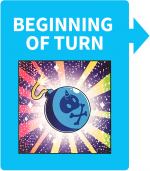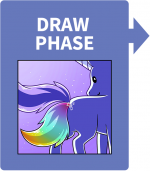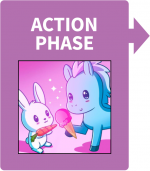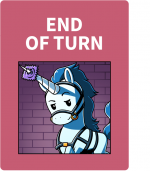Difference between revisions of "UU - Gameplay Structure"
WyvernWrath (talk | contribs) (→All players have the responsibility for correct gameplay) |
WyvernWrath (talk | contribs) |
||
| (2 intermediate revisions by the same user not shown) | |||
| Line 4: | Line 4: | ||
'''This doesn't allow for fixing "I don't like how that turned out" mistakes, if played correctly then it is a valid play (no take backs).''' ''*Flexibility within the game group if a player is allowed a take back.'' | '''This doesn't allow for fixing "I don't like how that turned out" mistakes, if played correctly then it is a valid play (no take backs).''' ''*Flexibility within the game group if a player is allowed a take back.'' | ||
| + | |||
| + | <span style="color:orange">'''Choosing Targets for Effects'''</span> | ||
| + | <br>There are two play styles for player targeting that you can use when playing Unstable Unicorn: | ||
| + | * '''Option 1 (easy): '''When you play a card with an effect, you must declare which player(s) you are targeting before using the effect. This allows players to decide if they want to respond with a Neigh card. | ||
| + | * '''Option 2 (advanced): '''When you play a card with an effect, players have to choose if they want to use a Neigh card before you select targets. | ||
| + | |||
| + | Both options are viable for gameplay, so you can select your house rules for consistency within the game. | ||
| + | |||
| + | *'''Option 1 (easy); only the requirement target is declared not targets after a conditional outcome.''' ''When a Upgrade, downgrade, or unicorn card is announced only the stable it would be entering is declared. A played magic card would target a specific card, stable or player.'' | ||
| + | *'''Option 2 (Advanced); No information is declared on announcement''' ''If a player does declare a target they cannot change targets on resolution. There is no argument to be made that they were bluffing, or ability to say whatever they want (Unless determined it's an invalid target statement).'' | ||
| + | |||
| + | '''One of these options MUST be chosen by the game group prior to game start, default is option 2.''' | ||
| + | |||
| + | ---- | ||
'''[[UU Game Terminology - Beginning of Turn Phase|Prior to the Beginning of turn Phase.]]''' ''(Does not occur in a phase)'' | '''[[UU Game Terminology - Beginning of Turn Phase|Prior to the Beginning of turn Phase.]]''' ''(Does not occur in a phase)'' | ||
Latest revision as of 23:13, 30 November 2023
All players have the responsibility for correct gameplay
Any player may query any effect and resolution that could be wrong. This includes things that are targeted when they could not, or things that were missed doing altogether. This doesn't allow for fixing "I don't like how that turned out" mistakes, if played correctly then it is a valid play (no take backs). *Flexibility within the game group if a player is allowed a take back.
Choosing Targets for Effects
There are two play styles for player targeting that you can use when playing Unstable Unicorn:
- Option 1 (easy): When you play a card with an effect, you must declare which player(s) you are targeting before using the effect. This allows players to decide if they want to respond with a Neigh card.
- Option 2 (advanced): When you play a card with an effect, players have to choose if they want to use a Neigh card before you select targets.
Both options are viable for gameplay, so you can select your house rules for consistency within the game.
- Option 1 (easy); only the requirement target is declared not targets after a conditional outcome. When a Upgrade, downgrade, or unicorn card is announced only the stable it would be entering is declared. A played magic card would target a specific card, stable or player.
- Option 2 (Advanced); No information is declared on announcement If a player does declare a target they cannot change targets on resolution. There is no argument to be made that they were bluffing, or ability to say whatever they want (Unless determined it's an invalid target statement).
One of these options MUST be chosen by the game group prior to game start, default is option 2.
Prior to the Beginning of turn Phase. (Does not occur in a phase)
- Flare Gun is played when a player's turn begins.
- Second Print Puppicorn effect is triggered when a player's turn begins.
All effects resolved - Game status check - win condition or continue to the Beginning of turn phase. If a mandatory effect skips that phase then proceed to the next unskipped phase.

|
Phase 1:Beginning of Turn - Cards in your stable that states, "If this card is in your stable at the Beginning of turn," trigger now. | |
|---|---|---|
Mandatory effects MUST be triggered.
Optional effects MAY be triggered, but must be chosen to do so now. (Continuous optional effects May be chosen do so during the appropriate phase).
- All effects trigger simultaneously;
- All mandatory effect targets are assigned, then optional effect targets are assigned.
- No target can be targeted more than once.
- If you move to your Draw phase without triggering an optional triggered effect, you can no longer trigger that effect this turn.
- The order effects are resolved will not change the outcome.
- Any effect that would immediately skip to your End of Turn phase will not prevent any other effect from resolving.
- If any new cards enter the stable during phase, effects that state "If this card is in your stable at the Beginning of turn," will not trigger. These Cards were NOT in the stable at the Beginning of turn.
All effects resolved - Game status check - win condition or continue to the Draw phase. If a mandatory effect skips that phase then proceed to the next unskipped phase.
Beginning of turn phase may cause effects due to the resolution of effects or Cards played, these each creates a CHAIN and links in that chain are resolved simultaneously;
- Trigger an enter effect.
- Trigger a continuous mandatory effect.
- Trigger a replacement effect.
- Trigger a discard pile search; A Bring effect may return a card from the discard pile to stable.
- Trigger a Deck search; A targeted card type must be selected if able. A player cannot choose to NOT find something if a valid target is available. A searched card must be revealed to all players if brought into a player's hand.
- Return or Add a card to a player's hand.
- A player may have to Discard a card from their hand.
- Destroy a card and place it into the discard pile.
- Sacrifice a card and place it into the discard pile.
- Skip phases of the current turn. The same phase can be skipped by multiple effects and will fulfill any requirement effect if any.
- Allow extra Cards drawn in the Draw Phase. Any card text stating to draw 'extra', the card is drawn in the Draw phase (not now), If the Draw Phase is skipped these extra cards will not be drawn.

|
Phase 2:Draw - DRAW 1 card from the deck. | |
|---|---|---|
All effects resolved - Game status check - win condition or continue to the Action phase. If a mandatory effect skips that phase then proceed to the next unskipped phase.
Draw Phase effects may cause effects due to the resolution of effects or Cards played;
- Trigger a continuous mandatory effect.
- A player may have to Draw a card to their hand.
- A player may have to Discard a card from their hand.

|
Phase 3:Action - Play a card from your hand or DRAW an additional card from the deck. | |
|---|---|---|
Effect to play ONE card from your hand;
When any card is announced to be played other players MUST be given the opportunity to play an instant card (Neigh), simply asking "any response?" is a good verbal cue to get players to "pass". Once all players have had a chance to pass and everyone has indicated they do not wish to play an instant card, the card "resolves". A player cannot now choose to play an instant card (Neigh), they were given the chance and declined. A player cannot assume a card is Un-Neigh'd and proceed to resolve a card without giving other players this opportunity to react to the card play. Instant cards can be played any time any other player plays a card (unless otherwise stated). If an Instant card is played in response to a card you played, you may respond with an Instant card of your own (even though you already played a card this turn). Any number of Instant cards can be placed onto the instant pile during a single turn. If the one card chosen to be played as the action is Neigh'd the player does not get to choose another card to play, the one action of the phase has been used.
OR
DRAW 1 card from the deck. A continuous effect may allow a player to play 2 Cards during the Action Phase, the player can either play 1 or 2 Cards OR draw one card as the action. This effect will not let two Cards be drawn.
All effects resolved. Game status check - win condition or continue to the End of Turn phase. There are no effects that will specifically skip an End of turn Phase.
Action phase may cause effects due to the resolution of effects or Cards played;
- Trigger an enter effect.
- Trigger a continuous mandatory effect.
- Trigger a replacement effect.
- Trigger a discard pile search; A Bring effect may return a card from the discard pile to stable.
- Trigger a Deck search; A targeted card type must be selected if able. A player cannot choose to NOT find something if a valid target is available. A searched card must be revealed to all players if brought into a player's hand.
- Return or Add a card to a player's hand.
- A player may have to Discard a card from their hand.
- Destroy a card and place it into the discard pile.
- Sacrifice a card and place it into the discard pile.
- Skip phases of the current turn. The same phase can be skipped by multiple effects and will fulfill any requirement effect if any.
- Skip another player's turn.
- Allow the current player to take another turn. This turn is a complete whole turn taken after the completion of the current turn.

|
Phase 4:End of Turn - End of turn effects trigger simultaneously, then the hand limit effect is resolved. | |
|---|---|---|
- End of turn effects have been resolved.
- hand limit effect resolved.
- The End of turn hand limit effect is a continuous effect that verifies the hand after each Discard if you have reached the hand limit. The turn will not end until the player is at the hand limit or below.
Game status check - win condition or continue to the next player's turn. If a mandatory effect skips that player's turn then proceed to the next unskipped player's turn. Skipped turns are cumulative so a player may have multiple next turns skipped.
End of turn Phase effects may cause effects due to the resolution of effects or Cards played;